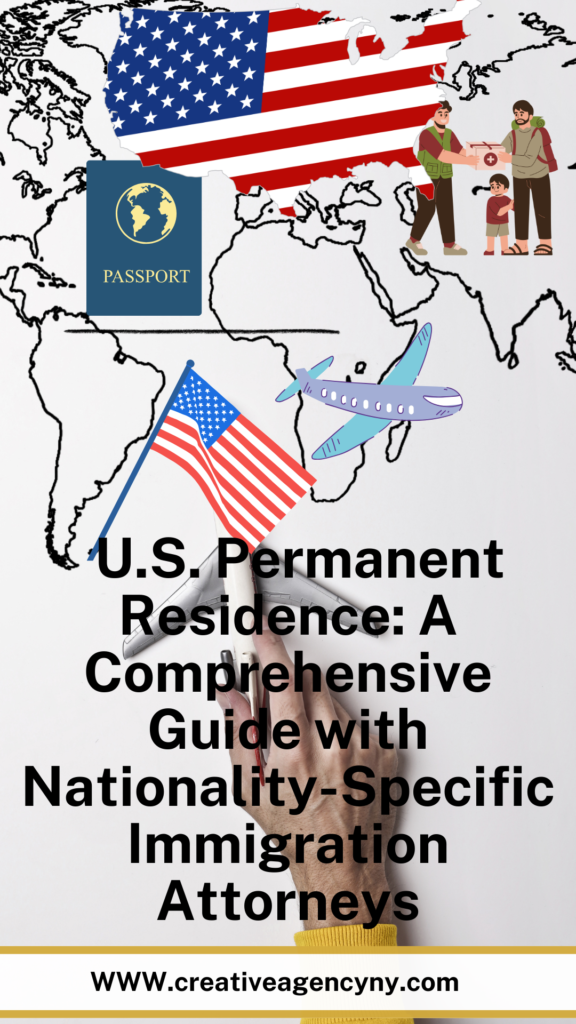
Introduction
Embarking on the journey to U.S. permanent residence, commonly known as obtaining a Green Card, is a pivotal step in establishing a stable and prosperous life in the United States. This comprehensive guide, presented in collaboration with expert immigration attorneys specializing in nationality-specific cases, delves into the intricacies of the Green Card process. Discover the significance of permanent residence and the invaluable role played by dedicated legal professionals who understand the nuances of nationality-specific immigration.
Understanding the Green Card: Gateway to the U.S.
Green Cards: A Symbol of Authorization
A Green Card, or permanent resident status, serves as both a symbol and a legal document authorizing individuals to live and work in the United States indefinitely. Administered by the United States Citizenship and Immigration Services (USCIS), the Green Card process involves a series of steps and considerations that vary based on individual circumstances.
A Guide to Immigration and Green Card Processing in the United States for Immigration Attorneys
Introduction
Immigration to the United States is a process that can be complex and challenging. This guide provides an overview of the most common immigration procedures, with a special focus on the process of obtaining a Green Card.
The Green Card
The Green Card, or permanent resident card, allows immigrants to live and work in the United States permanently1. There are several ways to obtain a Green Card, including through family, employment, and the Diversity Visa Program2.
Green Card through Family
Family visas are available to certain immediate relatives of U.S. citizens and lawful permanent residents3.
Green Card through Employment
Employment-based visas are available for skilled and unskilled workers, as well as individuals with extraordinary ability in certain areas3.
Green Card through the Diversity Visa Program
The Diversity Visa Program, also known as the «visa lottery,» allocates visas to individuals from countries with low rates of immigration to the United States3.
Green Card Application Process
The Green Card application process includes filing an application, paying fees, and attending an interview at a U.S. consulate or embassy1.
Obtaining Permanent Residence: Navigating the Complex Landscape
The Indispensable Role of Nationality-Specific Immigration Attorneys
Navigating the multifaceted realm of immigration law demands expertise, and immigration attorneys specializing in nationality-specific cases are instrumental in ensuring a smooth journey to permanent residence. With a focus on personalized guidance tailored to specific nationalities, these legal professionals play a crucial role in addressing immigration matters comprehensively.
Services Offered by Immigration Attorneys
Immigration attorneys specializing in nationality-specific cases provide invaluable assistance in various areas, encompassing family-based petitions, employment-based Green Cards, and humanitarian programs. Whether the path to permanent residence involves family sponsorship, employment opportunities, or investment, these legal experts ensure a nuanced understanding of the process while optimizing SEO strategies to reach a wider audience.
Common Paths to Permanent Residence
1. Family-Based Petitions:
Explore our detailed page on family-based petitions, covering marriages, engagements, and eligible family members, with a focus on nationality-specific nuances. Our team of nationality-specific immigration attorneys is dedicated to guiding you through the intricacies of family-based Green Cards.
2. Employment-Based Green Cards:
This is the most frequently traversed path, spanning a diverse range of job categories and work petitions. Learn about the application process, job offers, and the various avenues available to aspiring permanent residents, specifically tailored to your nationality. Our expert attorneys will navigate the complexities, ensuring a smooth transition to permanent residence in the U.S.
3. Investment:
Specialized visa categories allow individuals to secure a Green Card through monetary investments in the United States. Delve into the requirements, benefits, and considerations associated with this unique pathway, with insights tailored to specific nationalities. Our nationality-specific immigration attorneys will guide you through the investment immigration process.
4. Self-Petition:
Discover how individuals with extraordinary abilities or those granted a National Interest Waiver can initiate the Green Card process on their own, with nationality-specific considerations taken into account. Our skilled attorneys will provide personalized assistance throughout the self-petition process.
5. Asylum and Refugee Status:
Understand the administrative and immigration court proceedings that lead to obtaining permanent residence through asylum or refugee status, with insights into nationality-specific implications. Our dedicated immigration attorneys specializing in nationality-specific cases will advocate for your asylum or refugee status.
Special Categories: Beyond the Basics
In addition to the common paths, there are numerous special categories individuals may explore, including:
- Religious Worker
- Physician National Interest Waiver
- Iraqi Who Assisted the U.S. Government
Exploring Additional Paths to Permanent Residence
Dive into lesser-known avenues for obtaining a Green Card / Permanent Residence, such as:
- Amerasian Child of US Citizen
- Armed Forces Member
- Cuban Native or Citizen
- Diversity Immigrant Visa Program
- Informant (S Visa)
- Legal Immigration Family Equity (LIFE) Act
- Nicaraguan and Central American Relief (NACARA) Act
- Registry
- Special Immigrant Juvenile (SIJ)
- Victim of Criminal Activity (U Visa) and Victim of Trafficking (T Visa)
10 Ways to Immigrate and Live Legally in the United States
Immigration Attorney in Houston
Emigrating to the United States with legal status is not a simple task, and living with permanent status can be even more challenging. Explore the following programs that allow you to live in the United States temporarily and permanently. Do you qualify for any of them?
1) Green Card through a Family Member
The majority of Green Card beneficiaries obtain it through this avenue. In 2018, 44% were immediate family members of U.S. citizens, and an additional 20% were relatives with limited admission. To apply, submit Form I-130 to USCIS. Eligible individuals include unmarried children (under 21) or spouses of U.S. citizens. Other family members such as parents or siblings can also apply, but their processing time is longer as they are not prioritized. (Permanent Residence)
2) Green Card through Employment
Granted based on a petition from an employer, individuals demonstrating extraordinary skills in sciences, arts, education, business, or athletics, as well as teachers or researchers, receive preference. The employer initiates the process by submitting a labor certification or request (ETA-750) to the Department of Labor, proving the need for foreign labor. The next step involves the employer submitting Form I-140, Immigrant Petition for Alien Worker, to USCIS. Having an employer act as a financial sponsor is crucial to ensure the worker has a salary to sustain themselves in the U.S. without requiring government assistance. (Permanent Residence)
3) Visa Lottery
The Diversity Visa program, created in 1990, welcomes immigrants from countries with historically low immigration rates to the U.S. Also known as the visa lottery, individuals selected to receive a Green Card are chosen randomly from the pre-registered eligible list. 4% of Green Cards are awarded through this program. (Permanent Residence)
4) H-2B Visa: Gardening, Construction, and Cleaning
Through the H-2B visa program, companies in the U.S. can recruit foreigners for non-agricultural temporary jobs. This program is open to workers with or without experience who do not require academic or professional degrees. Jobs include gardening, construction, cleaning, hospitality, forestry, waiting tables, factory work, and more. The U.S. government limits the number of H-2B visas each fiscal year. (Temporary Stay)
5) H-2-A Visa: Agricultural Workers
Mexicans can temporarily work as agricultural workers in the U.S. through the H-2A visa program. U.S. companies can hire foreigners for planting and harvesting seasons if they prove there are not enough qualified Americans available. Foreigners can work in fields or greenhouses, with a maximum stay of 3 years, renewable if the employer requests the worker for additional seasons. (Temporary Stay)
6) H-1B Visa: Specialized Workers
H-1B visas are granted at the request of employers in need of highly skilled foreign workers. Applicants must have extensive theoretical or technical experience in fields such as science, engineering, or programming. USCIS specifies that the worker must hold a Bachelor’s or postgraduate degree from an accredited university. The number of H-1B visas is subject to a maximum limit set by authorities. (Temporary Stay)
7) TN Visa: Mexican Professionals
The U.S. has a special visa for temporary workers from Mexico and Canada engaged in activities outlined in the free trade agreement between the three countries. Known as the TN visa, it is granted to individuals with specific professions such as engineers, teachers, lawyers, accountants, scientists, and others. Mexicans must apply for the TN visa at the U.S. Embassy or Consulate in Mexico. Initial stay duration is up to three years, with extensions possible through Form I-129. (Temporary Stay)
8) Fiancé Visa
The K1 visa, commonly known as the fiancé visa, is for foreign citizens who intend to marry U.S. citizens in the U.S. and subsequently wish to become legal permanent residents without leaving the country. The document allows a 90-day period for foreigners to travel, conduct their wedding, and initiate permanent residence procedures with the U.S. Citizenship and Immigration Service (USCIS). (Temporary Stay with Permanent Option)
9) Investor Visa
13% of new residents in 2018 were sponsored by employers or invested money in the U.S. through the EB-5 visa. It grants permanent residence and later citizenship to those who invest $1.8 million in urban areas or $900,000 in rural areas. The investment must generate jobs for Americans. (Permanent Residence)
10) Citizenship through Naturalization
Naturalization is the process through which foreign individuals are granted U.S. citizenship. To be eligible, applicants must meet the requirements outlined in the Immigration and Nationality Act. Those eligible include individuals who have been permanent residents for at least 5 years or residents for 3 years with a U.S. citizen spouse. The process to become a citizen is not simple, but the U.S. Citizenship and Immigration Service (USCIS) has created a 10-step guide for a more orderly and clear process. (Permanent Residence)
Conclusion: Your Tailored Path to Permanent Residence
In conclusion, the journey to permanent residence in the United States is nuanced, and individual paths may differ based on unique circumstances. Nationality-specific immigration attorneys become invaluable allies, guiding applicants through the intricate process, assessing eligibility, and ensuring a successful outcome. Consult with immigration attorneys specializing in nationality-specific cases for a personalized and effective approach to your U.S. permanent residence journey.
 Creative agency information Information about media, marketing y creative
Creative agency information Information about media, marketing y creative



